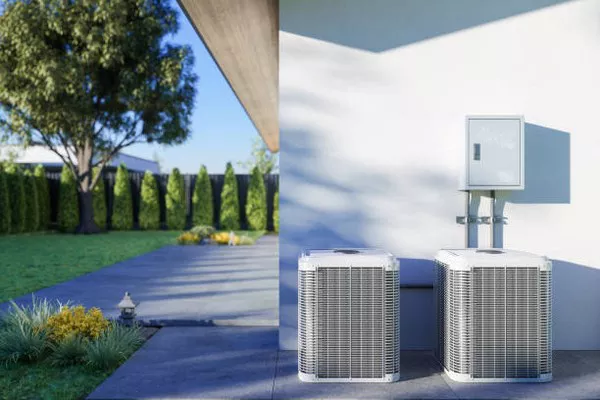In the scorching heat of summer, a malfunctioning air conditioning (AC) system can be a major inconvenience. One common issue that homeowners face is when the AC compressor fails to kick on. This can lead to discomfort and frustration, especially during peak temperatures. In this comprehensive guide, we’ll delve into the potential reasons behind this problem and explore troubleshooting steps to get your AC compressor up and running efficiently.
Understanding the AC Compressor: A Vital Component
Before diving into troubleshooting, it’s crucial to understand the role of the AC compressor within the system. The compressor is essentially the heart of the air conditioning unit. It’s responsible for pressurizing the refrigerant and circulating it through the system, which ultimately leads to the cooling of indoor air. When the compressor fails to kick on, it disrupts this vital process, resulting in a lack of cooling.
1. Electrical Issues
Electrical problems are among the most common culprits behind a non-functional AC compressor. These issues can range from simple to complex and often require a systematic approach to diagnose and resolve.
Power Supply Interruptions
The first step in troubleshooting electrical issues is to check the power supply to the AC unit. Start by verifying that the unit is receiving power. Check the circuit breaker or fuse box to ensure that the breaker hasn’t tripped or the fuse hasn’t blown. If either is the case, reset the breaker or replace the fuse and observe whether the compressor kicks on.
Faulty Wiring
Faulty wiring can also prevent the compressor from turning on. Inspect the wiring connections at the thermostat, air handler, and outdoor unit for any signs of damage, corrosion, or loose connections. If any issues are found, tighten connections and replace damaged wiring as necessary.
Capacitor Problems
The capacitor is a component responsible for providing the initial jolt of electricity needed to start the compressor motor. If the capacitor is faulty or weak, it may fail to provide sufficient power, preventing the compressor from turning on. Use a multimeter to test the capacitor for continuity and replace it if it’s defective.
2. Refrigerant Issues
Another common cause of compressor failure is related to refrigerant issues. The refrigerant plays a crucial role in the cooling process, and any imbalance or leakage can disrupt the system’s functionality.
Low Refrigerant Level
Low refrigerant level is often indicative of a leak somewhere within the system. When the refrigerant level drops below a certain point, the pressure within the system may not be sufficient to activate the compressor. A professional HVAC technician can inspect the system for leaks, repair any damaged components, and recharge the refrigerant to the appropriate level.
Refrigerant Contamination
In addition to low refrigerant levels, contamination of the refrigerant can also impede the compressor’s operation. Moisture, air, or non-condensable gases such as air or nitrogen can degrade the performance of the refrigerant, leading to compressor failure. A thorough evacuation and recharge process, performed by a qualified technician, can help resolve this issue.
3. Mechanical Failures
Mechanical failures within the AC system can also prevent the compressor from kicking on. These issues often require professional diagnosis and repair due to the complexity of the components involved.
Compressor Motor Failure
If the compressor motor fails, the compressor will not be able to start. Motor failure can be caused by a variety of factors, including overheating, electrical issues, or general wear and tear. A skilled technician can assess the condition of the motor, diagnose any underlying problems, and either repair or replace the motor as needed.
Contactor Malfunction
The contactor is a switch that controls the flow of electricity to the compressor motor. If the contactor becomes worn or damaged, it may fail to make proper contact, preventing the compressor from receiving power. Inspect the contactor for signs of wear, corrosion, or burning, and replace it if necessary.
4. Thermostat Problems
The thermostat serves as the control center for the AC system, regulating the temperature and signaling the compressor to turn on when cooling is required. If the thermostat malfunctions, it may not send the appropriate signals to the compressor, leading to a failure to kick on.
Incorrect Settings
Start by checking the thermostat settings to ensure that they are correctly configured for cooling mode. Verify that the temperature setting is lower than the current room temperature and that the system is set to “cool” rather than “off” or “heat.”
Sensor Calibration
The thermostat contains a temperature sensor that measures the ambient temperature in the room. If this sensor is misaligned or malfunctioning, it may not accurately detect the temperature, leading to incorrect thermostat readings and erratic compressor operation. Recalibrate or replace the sensor as needed to ensure accurate temperature readings.
See also What Is The Purpose Of A Compressor? A Complete Exploration
Conclusion
A malfunctioning AC compressor can disrupt the comfort of your home, especially during hot summer months. By understanding the potential causes of compressor failure and following systematic troubleshooting steps, you can identify and address the underlying issues effectively. Whether it’s electrical problems, refrigerant issues, mechanical failures, or thermostat malfunctions, a proactive approach to maintenance and repair can help ensure the smooth operation of your air conditioning system. If you encounter complex issues or are unsure about DIY repairs, don’t hesitate to enlist the services of a qualified HVAC technician for professional assistance.


